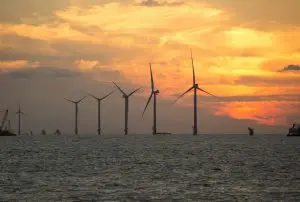With less than 50 days until the COP26 Summit, Brevia will be tracking the latest milestones in the UK’s preparations for the upcoming climate conference. This week the Prime Minister carried out an extensive reshuffle of his ministerial team, including a shake up at BEIS, with Greg Hands MP becoming the new Energy Minister. Other notable highlights this week include the publication of the funding details for the upcoming Contracts for Difference (CfD) Round 4 auction.
New Energy Minister
Following weeks, or rather months, of speculation over a possible reshuffle, the Prime Minister finally carried out his much-anticipated reshuffle.
The Prime Minister’s reshuffle saw The Rt Anne-Marie Trevelyan depart from BEIS and re-join the Cabinet as the Secretary of State for International Trade. Greg Hands MP has since been appointed as her replacement. However, BEIS has not yet confirmed whether his responsibilities will be exactly the same as his predecessors.[1]
Greg Hands has substantial ministerial experience and has worked in Government since 2011, with the exception of a brief gap between 2018 -2020, when he resigned from his position as Trade Minister to vote against the Government on the Heathrow Expansion.
Whilst some concerns have been raised over making a change to the Energy Minister so close to the COP26 summit, his appointment has been welcomed by industry. The Business and Energy Secretary, The Rt Hon Kwasi Kwarteng MP, as well as the COP26 President Designate, The Rt Hon Alok Sharma MP, have both kept their positions, as was expected.
Other changes include Helen Whately MP, who has replaced Kemi Badenoch MP as Exchequer Secretary to the Treasury and will now have responsibility for overseeing spending for net zero. Including the delivery of the Treasury’s Net Zero Spending Review document.
Another notable change is the move of The Rt Hon Michael Gove MP to Secretary of State for the Ministry of Housing, Communities and Local Government, where he will also have responsibility for levelling up. It is likely that the MHCLG will also receive a new name, to reflect responsibility for delivering the levelling-up agenda.
£265m for renewable energy
The Department for Business Energy and Industrial Strategy has set out further details for the upcoming CfD scheme, with £265 million in funding to be made available to renewable energy developers. [2]
Importantly, this is the first time that onshore wind and solar farms will be able to compete for the funds since 2015. A total of £10 million will be allocated to Pot 1 , which covers onshore, solar and hydropower. A capacity cap of 5GW has been placed on the pot.
£55 million will be made available for those less established technologies, such as floating offshore wind, tidal steam and geothermal. Notably, £24 million of this will be ringfenced for floating offshore wind.
Lastly, a total of £200 million will be allocated to offshore wind, where there will be no capacity cap.
Delay to the Environment Bill
The Government’s landmark Environment Bill looks set to be further delayed, making it unlikely to receive Royal Assent ahead of the COP26 Summit.[3]
The Bill has become the subject of a Parliamentary battle as it faces a number of amendments in the House of Lords, where it is currently at report stage. The Government was defeated on a number of the amendments earlier in the week, including one that would force ministers to declare a climate emergency. It is understood that the Government is not willing to accept a number of the House Lords amendments, meaning that the Bill’s Parliamentary journey will be further extended.
The Environment Bill has been hailed by the Government as its flagship climate policy in the post-Brexit era and is seen as an importance piece of legislation for the Government in its preparations for COP26. It was hoped that the Bill would showcase the UK’s commitment to tackling climate change ahead of the climate summit and subsequently encourage bold international commitments during the negotiations.
The Bill has already faced three delays, owing to the coronavirus pandemic, and concerns have been raised that the failure to pass the bill ahead of the conference will weaken the UK’s standing as a leader on climate change.[4]
BREVIA CONSULTING PROVIDES STRAIGHTFORWARD POLITICAL AND COMMUNICATIONS SUPPORT TO BUSINESSES AND ORGANISATIONS
Discover how Brevia can help you and your organisation by contacting the Brevia Energy Team on 020 7091 1650 or emailing us at: contact@brevia.co.uk
Notes
[1] Prime Minister’s Office, 10 Downing Street ‘Ministerial appointments: September 2021’, 15 September 2021, Link
[2] Department for Business, Energy and Industrial Strategy, ‘Biggest ever renewable energy support scheme backed by additional £265 million’, 13 September 2021, Link
[3] Tony Diver, The Telegraph, ‘Alok Sharma faces embarrassment on world stage as Environment Bill won’t be ready for Cop26’, 11 September 2021, Link
[4] Ruth Chambers, Green Alliance, ‘The further delay to the Environment Bill is a big blow to UK green leadership’ 13 September 2021, Link




